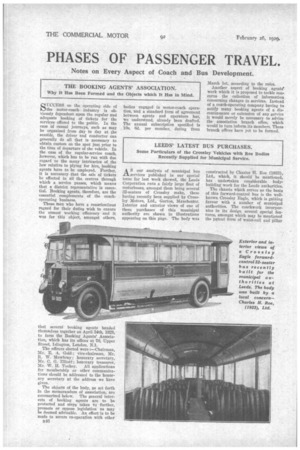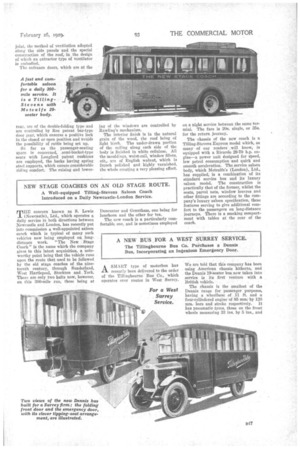PHASES OF PASSENGER TRAVEL.
Page 72

Page 73

If you've noticed an error in this article please click here to report it so we can fix it.
Notes on Every Aspect of Coach and Bus Development.
THE BOOKING AGENTS' ASSOCIATION.
Why It Has Been Formed and the Objects which It Has in Mind.
UCCESS on the operating side of
the motor-coach industry is obviously dependent upon the regular and adequate booking of tickets for the services offered to the public. In the case of casual journeys, such as may be organized from day to day at the seaside, the driver and conductor can generally do all that is necessary to obtain custom on the spot just prior to the time of departure of the vehicle. In the case of the regular-service coach, however, which has to be run with due regard to the many intricacies of the law relative to plying for hire, booking agents have to be employed. Further, it is necessary that the sale of tickets be effected in all the centres through which a service passes, which means that a district representative is essential. Booking agents, therefore, are the essential complements of the coachoperating business. Those men who have a conscientious regard for their duties wish to ensure the utmost working efficiency and it was for this object, amongst others, that several booking agents banded themselves together on April 24th, 192S, to form the Booking Agents' Association, which has its offices at 70, Upper Street, Islington, London, N.1.
The officers elected were :—Chairman, Mr. E. A. Gold ; vice-chairman, Mr. R. W. Mowbray ; honorary secretary, Mr. C. G. Elliott; honorary treasurer, Mr. W. H. Toohey. All applications for membership or other communications should be addressed to the honorary secretary at the address we have given.
The objects of the body, as set forth In the memorandum of association, are summarized below. The general interests of booking agents are to be protected and steps taken to further, promote or oppose legislation as may be deemed advisable. An effort is to be made to secure co-operation with other
B46 bodies engaged in motor-coach operation, and a standard form of agreement between agents and operators has, we understand, already been drafted. The annual subscription specified is 10s. 6d. per member, dating from
AS our analysis of municipal bus services published in our special issue for last week showed, the Leeds Corporation runs a fairly large fleet of motorbuses, amongst them being several 32-seaters of Crossley make, these having recently been supplied by Crossley Motors, Ltd., Gorton, Manchester. Interior and exterior views of one of these purchases of this municipal authority are shown in illustrations appearing on this page. The body was
March 1st, according to the rules.
Another aspect of booking _ agents' work which it is proposed to tackle concerns the collection of information concerning changes in services. Instead of a coach-operating company having to notify many booking agents of a discontinuance or extension of any service it would merely be necessary to advise the association branch office, which would in turn inform its members. These • branch offices have yet to be formed.
constructed by Charles H. Roe (1923), Ltd., which, it should be mentioned, has undertaken considerable bodybuilding work for the Leeds authorities.
The chassis which serves as the basis of this forward-control bus is the wellknown Crossley Eagle, which is gaining favour with a number of municipal authorities. The coachwork incorporates in its design several special features, amongst which may be mentioned the patent form of waist-rail and pillar
joint, the method of ventilation adopted along the side panels and the special construction of the roof, in the design of which an extractor type of ventilator is embodied.
The entrance doors, which are at the rear, are of the double-folding type and are controlled by Roe patent bar-type door gear, which ensures a positive leek in the closed or open position and avoids the possibility of rattle being set up.
So far as the passenger-seating space is concerned, semi-bucket-type seats with Longford patent cushions are employed, the backs having spring steel supports, which ensure considerable riding comfort. The raising and lower
ing of the windows are controlled by Rawling's mechanism.
The interior finish is in the natural grain of the wood, the roof being of light birch. The under-drawn portion of the ceiling along each side of the body is finished in white cellulose. All the mouldings, waist-rail, window fillets, ale., are of English walnut, which is french polished and highly varnished, the whole creating a very pleasing effect. on a night service between the same termini. The fare is 20s, single, or 35s. for the return journey.
The chassis of the new coach is a Tilling-Stevens Express model which, as many of our readers will know, is equipped with a Ricardo 29-70 h.p. engine—a power unit designed for speed, low petrol consumption and quick and smooth acceleration. The service saloon body, which Metcalfe's (London), Ltd., has supplied, is a combination of its standard service bus and its luxury saloon model. The construction is practically that of the former, whilst the seats, parcel nets, window louvres and other fittings are according to the company's luxury saloon specification, these features serving to give additional comfort to the passengers on long-distance journeys. There is a smoking compartment with tables at the rear of the coach.




















































































































